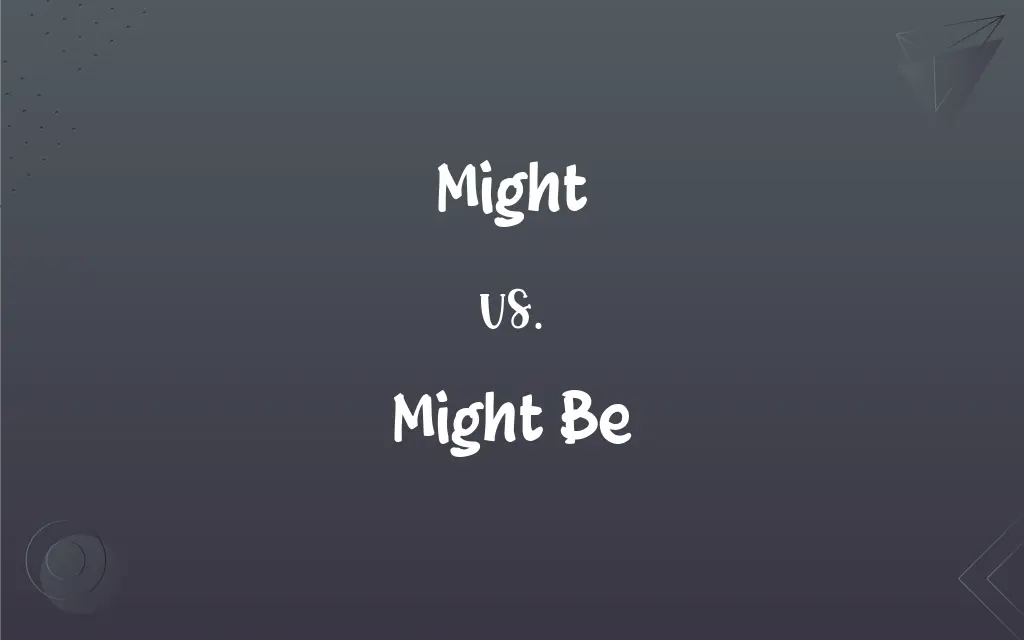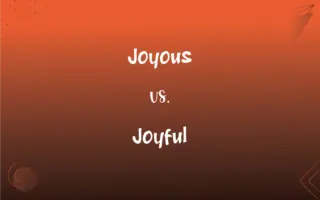Might vs. Might Be: What's the Difference?
Edited by Janet White || By Harlon Moss || Published on December 7, 2023
"Might" expresses possibility or uncertainty, often about past or present situations. "Might be" specifically indicates a possibility or potential state in the present or future.

Key Differences
Might is a modal verb used to indicate a possibility or potential action, often reflecting something that could happen but is not certain. While, might be specifically refers to the potential state or condition of something or someone, emphasizing a particular state of being that is uncertain.
In usage, might often introduces a hypothetical situation, suggesting a range of possible occurrences or actions. Might be, on the other hand, is used to express a tentative or speculative state of affairs, particularly about the nature or identity of something.
Might is versatile and can be used in various contexts, from expressing a slight possibility to a polite suggestion. However, might be is more focused, typically used to speculate about the current state or nature of something, often based on limited information.
When considering tense, might does not change form and can be used for past, present, and future possibilities. Whereas, might be is used primarily in the present tense, focusing on current or immediate future states.
In terms of nuance, might conveys a general sense of uncertainty or potentiality. Meanwhile, might be is more specific, often implying a guess or hypothesis about a current situation or condition.
ADVERTISEMENT
Comparison Chart
Basic Function
Expresses possibility or potential action
Indicates a possible state or condition
Temporal Use
Time-neutral (past, present, future)
Primarily present or immediate future
Contextual Usage
Broad possibilities, actions, suggestions
Specific states, conditions, identities
Degree of Certainty
General uncertainty, lower probability
Conditional possibility, speculative
Example
"She might go to the party."
"It might be raining outside."
ADVERTISEMENT
Might and Might Be Definitions
Might
Expressing a chance of something happening.
She might arrive late due to traffic.
Might Be
Suggesting an uncertain condition.
It might be cold outside.
Might
Used in a polite or formal request.
Might I borrow your book?
Might Be
Indicating uncertainty about identity.
The caller might be John.
Might
Suggesting a less likely scenario.
They might not agree with the plan.
Might Be
Proposing a possible scenario.
That noise might be the wind.
Might
Offering a polite or tentative proposal.
You might want to check your email.
Might Be
Reflecting on an undecided result.
The test result might be positive.
Might
Indicating uncertainty about the past.
He might have forgotten the meeting.
Might Be
Expressing a contingent event.
If it rains, the game might be canceled.
Might
Great power or force, as of a nation or army.
Might Be
That might be or occur; possible; potential; hypothetical.
Might
Physical strength
Push with all your might!.
Might Be
That which might be or happen; a possibility.
Might
Power, strength, force or influence held by a person or group.
FAQs
Is "might be" used for future conditions?
"Might be" is primarily for present or immediate future conditions.
Does "might be" suggest a definite state?
No, it implies a state that is uncertain or speculative.
Can "might" express a suggestion?
Yes, it can be used for polite or tentative suggestions.
Can "might" be used in questions?
Yes, particularly in polite or formal inquiries.
Can "might" be used for past events?
Yes, "might" can express uncertainty about past events.
Is "might" a strong modal verb?
"Might" indicates a lower probability compared to other modals like "must".
Does "might" have a past tense form?
"Might" remains the same in all tenses.
Can "might" indicate permission?
Yes, in formal contexts, "might" can request permission.
Does "might be" imply a guess?
Yes, it often conveys a hypothesis or guess.
Can "might" express a strong probability?
No, it generally suggests a weaker probability.
Can "might be" suggest a future outcome?
Yes, especially in terms of immediate or near future.
Can "might be" indicate a future plan?
Not typically, as it's more about speculation than planning.
Is "might be" specific to a person's state?
It can refer to both things and people's states or conditions.
Is "might" appropriate for strong assertions?
No, it's used for less certain or more tentative statements.
Can "might" be replaced with "could"?
Yes, in many contexts, though "could" can have additional meanings.
Is "might" formal or informal?
It's neutral, fitting both formal and informal contexts.
How does "might be" differ from "is likely"?
"Might be" is less certain than "is likely".
Is "might be" suitable for expressing facts?
No, it's used for possibilities, not certainties.
Does "might be" require additional context?
Often, as it is usually part of a speculative statement.
Is "might" interchangeable with "may"?
In many cases, yes, though "may" can be more formal or have slightly different connotations.
About Author
Written by
Harlon MossHarlon is a seasoned quality moderator and accomplished content writer for Difference Wiki. An alumnus of the prestigious University of California, he earned his degree in Computer Science. Leveraging his academic background, Harlon brings a meticulous and informed perspective to his work, ensuring content accuracy and excellence.
Edited by
Janet WhiteJanet White has been an esteemed writer and blogger for Difference Wiki. Holding a Master's degree in Science and Medical Journalism from the prestigious Boston University, she has consistently demonstrated her expertise and passion for her field. When she's not immersed in her work, Janet relishes her time exercising, delving into a good book, and cherishing moments with friends and family.






































































